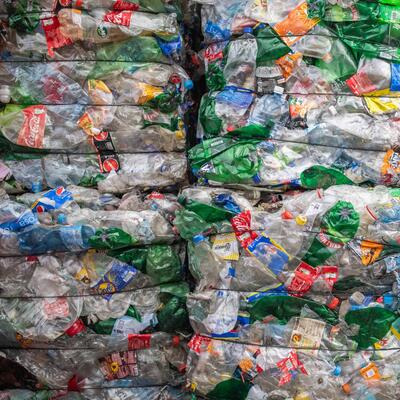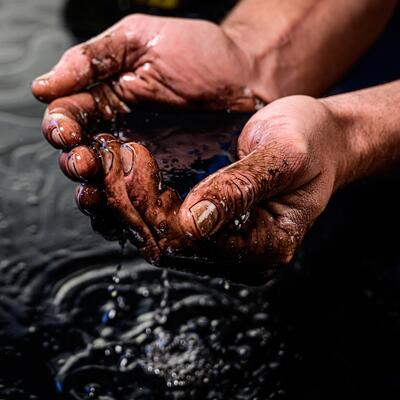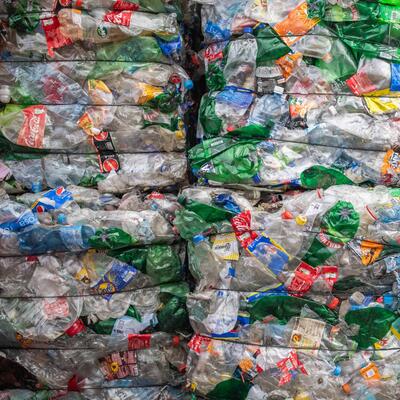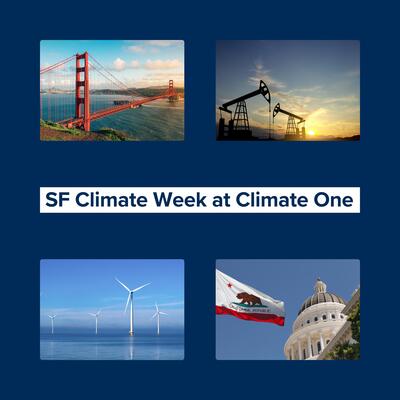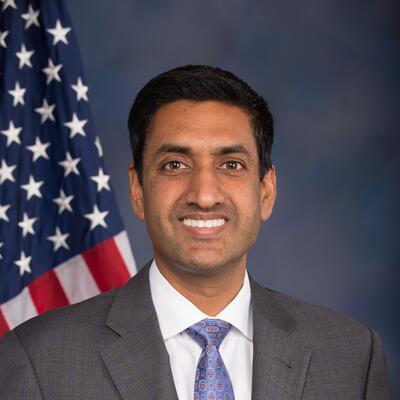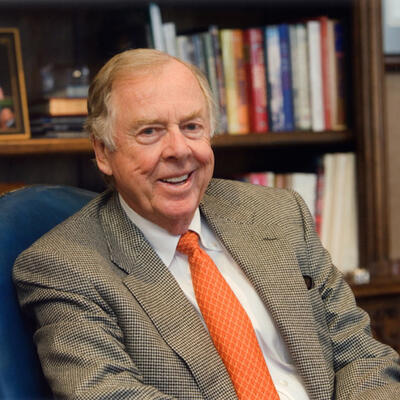
T. Boone Pickens on the Future of Oil
Guests

T. Boone Pickens
Summary
Will the U.S. oil boom cripple OPEC? Could oil reach $100 a barrel again? What’s ahead for renewables? A conversation with the Oracle of Oil, Boone Pickens.
T. Boone Pickens, Chairman and CEO, BP Capital Management
This program was recorded in front of a live audience at the Commonwealth Club of California on March 24, 2015.
Full Transcript
Greg Dalton: From the Commonwealth Club of California, this is Climate One. I'm Greg Dalton. Today we're discussing powering America's future with oil man T. Boone Pickens. A barrel of oil costs about half of what it did a year ago, and that's good news for the U.S. economy. Drivers are paying less at the pump and America is sending less money overseas, but the slump has a downside. Energy companies are laying off employees and laying down their oil rigs. And Americans are buying more gas-guzzling cars that are a big source of carbon pollution. Over the next hour, we will talk about oil, natural gas, the new geopolitics of energy, and probably a little Oklahoma football. This program is part of the Commonwealth Club's series on ethics and accountability underwritten by the Charles Travers Family Foundation. T. Boone Pickens is head of BP Capital, an energy investment company, and a legend in the oil industry. Please welcome him to the Commonwealth Club.
[Applause]
T. Boone Pickens: Thank you. I want to make an opening remark. This is my fourth time to the Commonwealth Club.
Greg Dalton: Welcome back.
T. Boone Pickens: And it was the second time I was here, which had to have been 20 years ago, it wasn't in this location. But I've said sometimes, I don't say it anymore, that if I'm leaving right after I speak, I'd say if anybody wants to go to Amarillo, Texas, that's where I lived at the time, and I said, "If anybody is here who wants to go to Amarillo, Texas, I'm going, I've got room to take you." You aren't going to find 200 people in a room that wants to go to -- I mean, not 200, but you aren't going to find one or two people to go to Amarillo, Texas. And so this guy raised his hand. And so I said, "You want to go to Amarillo?" He said, "Yes." And I introduced myself to him. He said, "Well, I'm Scott McCart." And I said, "Yeah, you're Roy Ann McCart’s son." And he said, "That's right." And he said, "My mother is sick and if I could," -- I said, "Yeah, come on. Jump in."
But it was at the Commonwealth Club, I picked up one, and over a period of time asking people if they want to go to Amarillo, Texas. I picked up people three times out of probably 50 or 100 offers. I don't say Dallas, I’d get more’n that.
[Laughter]
Greg Dalton: Your dad got into the oil industry in 1923, almost 100 years ago. There’ve been lots of cycles that you've seen up and down.
T. Boone Pickens: About '23 my mother and dad got married. I was born in '28, five years later.
Greg Dalton: So you've seen a lot of ups and downs in the energy industry. Is this recent down cycle just like the others or is it different in any way?
T. Boone Pickens: Oh, it's much different. I mean, well, you go back to the -- you had one in '08, that was a market reaction. But you had the one in '86 that people try to compare to. And '86, that was brought on by Bill Casey, remember the CIA director, and he convinced President Reagan to get the Saudis to overproduce, flood the market and break the Russians. You remember that?
Greg Dalton: I remember Bill Casey.
T. Boone Pickens: Yeah. That's in the book Victory and it's worth reading. It was a very, very interesting - it wasn’t a story, but it was what happened at that point in time. But this time, the United States is the one that overproduced, which is incredible. And this geologist, listen, I'd give you 100 to 1 odds that never again will the United States ever be at the level of production that we are. We're producing 9.5 million barrels a day. And we went all the way down to 4.5 million, and have come back from 4.5 to 9.5.
Greg Dalton: And Saudi Arabia is playing a very different role this time. They've been controlling the spigot that effectively controls that world oil price. What are they doing differently this time? Are they trying to break frackers, American frackers, in Texas and Pennsylvania?
T. Boone Pickens: I don't believe -- no. Listen, I have more respect for Naimi, their oil minister, and I said one time, I was on CNBC and they said, "You know, you've predicted oil prices 21 times on this show and you've been right 18 times. How do you do it?" And I said, "That guy that works for the Saudis," I said, "Naimi," I said, "I watch what he says and two weeks later I say the same thing he did." [Laughter]
That wasn't exactly right. But the man one, is smart and I think he wants credibility just like I do. I don't want to get in front of a crowd and say something stupid. And I don't want to get up and try to mislead somebody. He doesn't either. The guy wants credibility and he said this when the price fell out. Well, normally -- the cartel is not a cartel any longer. OPEC is a trade association, is what it is. Because the only country that has a flexibility to lower or raise production are the Saudis. And so they're the ones that were the swing producer, and they accepted the role and were the swing producer. When the price came down, they would just supply to balance the market and bring the price back up. They weren't trying to take advantage of anybody. I mean, they have social commitments in their country just like the rest of them, Iranians and everybody else, social commitments. They're taking care of people that are not working is what it amounts to. And they have over 50% unemployed, so they're having to take care of them. I've had people say, "Well, the Saudis could produce for $5 a barrel." No question they could if they didn't have the social commitments that they have.
And when they tell you they've got to have $90 a barrel to meet those commitments, it’s -- they also have cash reserves of over $800 billion. So they can hold out for a long time. But to balance their budget, they've got to have $90 oil.
Greg Dalton: How is this affecting Russia, the low oil prices? Is it helping or hurting them?
T. Boone Pickens: Boy, yeah, I mean, really it hurts them. Russia, when you look at Russia, you're looking at a country that now is poor, their economy is weak, they don't have many industries, they're not competing well. I said the other night they only have three things. I said, they have oil and gas, which is kind of the backbone of everything. I said, they have vodka and they drink most of it, and I said, and they have caviar, and I said, anybody has it once, they don't go back and get any more. [Laughter] And I then immediately, the guy I was in touch with, he was from New York, he said, "I market Russian vodka here. And, Mr. Pickens, it is a business and we do have," and he sent me a case of Russian vodka. So I thanked him. I don't drink vodka.
Greg Dalton: You were a peak oil advocate not long ago and thought the dwindling supply of petroleum, that the big fields had already been found, and reading your book, The First Billion is the Hardest, which was published in 2008, it seems --
T. Boone Pickens: It was the hardest, too.
Greg Dalton: Yeah?
T. Boone Pickens: Yeah. I was 70 something before I was worth a billion dollars. I ran it up to five pretty fast and then lost two, gave away one, had one left and I don't know what happened to the other.
[Laughter]
Greg Dalton: It's a good thing you don't drink vodka because that could have been --
T. Boone Pickens: I quit. I never was a vodka drinker, but I did drink scotch. My dad said to me one time, he said, "Son, there are three things I don't like about you." I said, "What are they?" And he said, "Well, one, you drink scotch instead of bourbon." And he said, "I'm always suspicious of anybody who drinks scotch." And he said, "Second --" my dad was a land man in the industry, and I'm a geologist. And so he said, "Second was that you never smoked cigars." And I said, "Okay, those are not too bad. What's the third one?" He said, "Land men can pick locations as good as geologists can." And I said, "By Golly, if that's all the problems we have, we've got a pretty good relationship." And we did have. We had a great relationship.
Greg Dalton: And you wrote that you were going to be a veterinarian and it was your dad that guided you towards geology and oil, is that right?
T. Boone Pickens: Well, my dad -- yes. I went to Texas A&M. You won't believe this. I was 5'9" and white, and I went down there as a basketball player.
[Laughter]
Greg Dalton: How did that work out?
T. Boone Pickens: Well, they didn't renew the scholarship the next year and I transferred to Oklahoma State. And two, three years ago, they had the 12th Man Magazine, which is the Texas Aggie magazine, the 10 worst mistakes they made. The third one was when they cut Boone Pickens off a $25 a month scholarship.
Greg Dalton: So on energy, it seemed like peak oil and then hydraulic fracturing and horizontal drilling, two technologies came together, and it seemed to me that, reading your book, that you were surprised by that, that the tremendous new supply in America becoming the Saudi Arabia of oil. You didn't see that coming?
T. Boone Pickens: Well, I'm not dead on peak oil.
Greg Dalton: Still possible?
T. Boone Pickens: Every place but here has peaked. There is no additions from any other countries except Iraq. And Iraq has oil to be found and produced. But the rest of the world is pretty -- I mean, if you go back and look at the last five years, you've increased demand by seven million barrels a day and the United States has provided five of that. So the rest of the world is pretty well peaked. And you didn't get what you wanted out of Brazil. It's not what they thought they had. And additions that the world thought they would have all been provided by the United States, which was horizontal drilling and multiple fracks and the horizontal hole.
Greg Dalton: Cuba is about to open up. Is there significant oil in Cuba?
T. Boone Pickens: Cuba? [Laughter] Cuba doesn't have any more oil in it than Vermont.
[Laughter]
Greg Dalton: Okay. All right. There's going to be some people who are disappointed who think that there is oil in Cuba.
T. Boone Pickens: Oh, they think they've got something off there between the United States and Cuba, and there's been, of course, a lot of sizing work done in there. But you don't see any big oil fields off Florida. You have Destin Dome is the only one. That's probably not over a trillion cubic feet of gas which is not a lot.
Greg Dalton: So advocates of hydraulic fracturing would say this new technology came along, unleashed new supply that a lot of people didn't anticipate, and that peak oil was therefore bunk and bogus. You're saying that that's not necessarily true, that fracking won't have a long-lasting increase in world supply, this new technology.
T. Boone Pickens: Well, we don't know what it's going to do around the world, but you have to assume that if you have oil fields, you have source rock. And these shale fields that are developed, that is source rock, meaning that's where the oil and gas were formed. And due to heat and pressure, they were squeezed out and into what we call conventional reservoirs - sandstones, limestones and dolomites. And I said we'd found all the big ones in those conventional reservoirs. And we pretty well have in the United States. But then we showed up with all this shale. But there's a reason for this. There have been, oh, five million wells drilled in the world today since you first started drilling wells, and over half of them are in the United States So that's interesting. Why do we have over half of the wells drilled? You know why?
Greg Dalton: We started doing it first?
T. Boone Pickens: No, not really. The reason is -- do you know what freehold minerals are?
Greg Dalton: No.
T. Boone Pickens: The United States is the only country that minerals are owned by people like us in this room. it all started because those minerals have been sold, but they've been sold by the original owners sometimes. Sometimes they haven't. But if you bought a farm, you got everything below it. Not any place else in the world. We're the only place you have that. So you look at the United States and say, is that the reason? You got it. That freehold, the ownership by individuals, caused the development to be much greater in the United States than the rest of the world. Because you go to Poland, Australia, Canada even, and the government, federal government owns the minerals below the surface.
Greg Dalton: And in California, there's something called the Monterey shale which could be a huge new deposit. It hasn't been cracked yet. Do you think there's promise in the Monterey shale in California?
T. Boone Pickens: Oh, sure, you've already had Exxon drill off of Bravo platform offshore California five years ago, and they drilled the longest, at that time -- Russians have one that's 100 feet longer, I think, now -- 25,000 feet they drilled back to shore in California, Monterey shale. And sure, it will be productive. But -- and here, you've got, I don't know, some more fracking or something in California.
And I was asked about that in New York. A TV show said, "The governor here in New York has put a moratorium on fracking in New York State. What do you think about that?" I said, "Well, you saw what he said, he said he'd put a moratorium on it until he understood what fracking was." That sounds like a responsible leader that would say that. Now, he needs to find out what it is and decide what he's going to do. I also said, "That gas in western New York is very similar to the gas in eastern Pennsylvania." And I said, that’s been there 300 million years. It isn’t gonna go anyplace. Meaning, they don't want to frack it this year or next year, but they will drill those wells and they will frack, and in California, you will drill.
But what is going to happen in California, if you don't want to drill it now -- because those landowners, they will start suing. They want their property developed because it has great value. If they have a farm or a ranch, the acreage there, if it has Monterey shale under it, it will be productive and they'll want income from it. And they're entitled to it and it will happen.
Greg Dalton: And fracking is happening in California. And Governor Jerry Brown has resisted calls to put a moratorium on fracking. It's been regulated, but it's definitely happening, it's been happening in California for decades.
If you're just joining us, our guest today at the Commonwealth Club is the oil investor T. Boone Pickens. I'm Greg Dalton. You can follow this conversation on Twitter, using the handle --
T. Boone Pickens: You know, you and I, Greg, talked a while before. I want to ask you some questions about climate.
Greg Dalton: Oh, okay. Fire away.
T. Boone Pickens: See. He was here to get me. [Laughter]
No, you and I talked a little while before. I think that, yes, we have done some things to the atmosphere, we've had a lot of emissions out of these vehicles and everything else, but if we think we have messed something up, then we should go to work on it. We shouldn't wait until it's confirmed that we messed it up. Go ahead and start doing something. [Applause] But I've said this for years, so.
Greg Dalton: In fact, I watched your TED talk and the very beginning of your TED talk says you accept global warming and you have a good record on that.
T. Boone Pickens: It's hard for a geologist because, I mean, this planet is four and a half billion years old. And we can go back in time and look, and we've had periods that have gone for millions of years of high CO2, much more than we've ever seen today, CO2 in the atmosphere. And that came from volcanoes. And so we know that there've been four and a half billion years, there've been a lot of different climate changes over that period. But you didn't have the people here --
Greg Dalton: Seven billion people.
T. Boone Pickens: That's right. They didn't have the people, that’s addition to what they didn't have, but they still had huge swings in what happened. You've had droughts that went on thousands of years.
Greg Dalton: Right. So is it hard to talk about this in Texas, climate change?
T. Boone Pickens: Do we?
Greg Dalton: Yeah.
T. Boone Pickens: Do we talk about it? You mean, just kind of bump into somebody on the street?
[Laughter]
Greg Dalton: The last time you were here I remember one of the things you said, “we have a saying in Texas, whatever you're talking, you're talking about money.” So --
T. Boone Pickens: You do the same thing in California. I mean, you talk about money. I mean, no kidding anybody, we all like to make money. That's one of the things that makes America so attractive to the world. I started out -- when I left Oklahoma State with a degree in geology, a wife and a baby, and went to Bartlesville, Oklahoma. I had a job when I got there. And I graduated on a Saturday and I went to work Monday morning. I had $150 when we left Stillwater and went to Bartlesville. And I told you what I had made and lost and all. And that opportunity, it's for everybody if you want to go after it. And I think that's unique about our country.
Greg Dalton: It certainly has served us well. I'd like to do a lightning round here and ask you a series of yes or no questions, just a quick yes or no.
T. Boone Pickens: Okay.
Greg Dalton: The U.S. economy needs to move away from fossil fuels to cleaner forms of energy. Yes or no?
T. Boone Pickens: No.
Greg Dalton: No. Investing in coal is a good move?
T. Boone Pickens: No.
Greg Dalton: BP Capital has made a lot of money in the last six years.
T. Boone Pickens: Yes. [Laughter] Now why are you laughing at me on that? [Laughter]
Greg Dalton: I hope you did. Congratulations. Yeah, it’s -- I mean, that was -- the economy was in bad shape in 2009. That was when President Obama came in. Next question here for Boone Pickens in our lightning round. The Koch Brothers are strengthening American markets and democracy.
T. Boone Pickens: I'm pretty much in agreement with the Kochs. There's some things I don't agree with. You said give you yes or no, I'd say yes.
Greg Dalton: Okay. We can come back to that. Shell Oil is going to lose a lot of money trying to drill in the Arctic. Yes or no?
T. Boone Pickens: That's all a timing issue. I'd say now, I wouldn't do it.
Greg Dalton: College athletes should be paid and get a share of the economic prosperity that flows from their performance.
T. Boone Pickens: You know, I'm into that subject pretty good and I was one of the early ones that said you should give -- yes, they should, yes. I'm not - I'm not talking about going and paying thousands of dollars. I'm talking about my idea was give them $300 a month. [Laughter] Well, what it was is, the guys get there, they can’t go -- they eat at the training table, food is good, it's fixed for them and gets best results for their bodies, and that's the right thing to do. But they like to have a night off every once in a while, too. And so -- I lived in an athletic dorm at Texas A&M. That was a long, long time ago. But anyway I would like to see them get some stipend to help them look like the rest of the students on the campus.
Greg Dalton: Last question, California is a better state than Texas?
[Laughter]
T. Boone Pickens: Well, better for what?
Greg Dalton: Yeah. [Laughter] Money, love, sex, business, I don't know. [Laughter] Business.
T. Boone Pickens: Business? I don't think there's any comparison.
Greg Dalton: Yeah, that's a bad one because California is difficult, high cost.
T. Boone Pickens: Listen, in Texas, we can balance the books. And you're starting to look like Washington.
[Laughter]
Greg Dalton: Well, back on the Koch Brothers -- where do you disagree with them?
T. Boone Pickens: Well, I got a disagreement with them over natural gas. They said I was wanting subsidies from the government, which wasn't so. And what I wanted was a tax refund. Actually I got 54 votes, and I needed 60, for my bill to pass and I got 54, so I lost, of course. But, yeah, I know the Kochs from way back, been friends of mine and all, and I think they're patriotic Americans and they're very conservative.
Greg Dalton: One thing that has been in the news lately is the Strategic Petroleum Reserve, where the United States buys oil off the market, puts it in the ground. Is that a market --
T. Boone Pickens: Yeah. You know how much is in there now?
Greg Dalton: How much is in there?
T. Boone Pickens: 697 million barrels. That's what Secretary Moniz told me three or four months ago.
Greg Dalton: And is that a price support? Is that a hidden subsidy? Because when the government buys that oil, it takes it off the market, does it keep the price --
T. Boone Pickens: But who is it a subsidy for?
Greg Dalton: Good question. You know it better than I do.
T. Boone Pickens: No. See, I don't -- do you remember when that bill passed?
Greg Dalton: No.
T. Boone Pickens: It was after the Arab embargo in '73. And they said, "Gosh, we got to get plenty of oil to give us 30, 60 days just in case this happened to us again." And so they decided to put 700 - up to 750 million barrels. I don't think they ever got -- they're at 700 now and I think that's about as high as they've gone. But the most we've drawn out in times of Katrina was the biggest draw out of the SPR was 18 million barrels. And now the United States is truly -- if you had an energy plan where you switch natural gas over to heavy-duty trucks, you would be energy-independent. That's about all you'd have to do to get there. But you are energy-secure today because of Canada and Mexico. We import about 3.5 million barrels a day, most of it from Canada to the United States. And so times have changed and I think you should pull that SPR down.
Greg Dalton: Strategic Petroleum Reserve.
T. Boone Pickens: Yes.
Greg Dalton: Draw it down.
T. Boone Pickens: I don't see any use for it and it's -- our costs in there, I believe, is $28 a barrel. So there's a huge profit there, one of the few profit centers the United States government has. And they got it kind of by accident. But I would pull it down.
Greg Dalton: You mentioned Canada. There's a lot of debate about the Keystone Pipeline. Recently Mayor Bloomberg wrote a proposal that the United States approve the pipeline -- and you've been a big advocate of approving the pipeline -- in exchange for Canada's commitment to reduce greenhouse gases. Is that a deal you would take?
T. Boone Pickens: Well, Canada’s a sovereign country. And I've lived in Canada in the '60s. I made a lot of money in Canada. I have friends there. I made some nice gifts to the University of Calgary. And so I feel connected to Canada in a way. But Canada is going to produce their oil. The Canadians are -- they actually, when I worked up there, they were more sensitive to the environmental issues than the United States was. And so I don't think you can make that trade. I interviewed on a podcast -- I think it’s what it’s called, that I have -- the ambassador to the United States from Canada. And we talked about the whole thing that's over the Keystone Pipeline. And they want to do business with us. I mean, they're our best ally. And they’ll never have a use for -- their country is not big enough to use the oil they produce. And they like the relationship with us, it’s stable and all. But, no, I wouldn't try to make that trade.
Greg Dalton: One consequence of blocking the Keystone Pipeline has been a lot more oil moving around on rail cars, how do you think that should be handled?
T. Boone Pickens: It's a lot better to move the oil in a pipeline than it is in rail car.
Greg Dalton: Safer.
T. Boone Pickens: Yes, it is.
Greg Dalton: But oil is happening, moving around on rail. Should that be changed? Should there be safer cars? What should be done about it?
T. Boone Pickens: Well, I mean, we're talking about America. We’re talking about business and all, and you start saying you can't move oil by rail, oops. It's going to make some unusual areas where you can't balance the market without moving the oil. So I think you have to do that.
Greg Dalton: Where do you think oil prices are going to go? You think they're going to go back up and see $100?
T. Boone Pickens: Yes. I think what's going to happen is you'll reach all-time -- you are already at all-time high inventories of oil in the United States. And Cushing, which is the pricing point for American oil, Cushing, Oklahoma. It happened 100 years that pipelines all kind of intersected at that point in Oklahoma and that's where they built the tank farms. They have storage there for -- I think that it's 80 million barrels. And I do know this, they're up to 56 million in storage now and you can't ever fill anything up.
Greg Dalton: To the tippy top, yea.
T. Boone Pickens: It doesn't work quite that way. You got to leave a little cushion. And they feel like at 65 million, they're full. I mean, to move oil in and out, to give you flexibility, you can't just fill it brimful. And so we're real close to filling up Cushing, and that prices oil in America. It's called WTI, West Texas Intermediate. So when you're sitting there looking at the television in the evening and they give you WTI in Brent -- well, Brent is a global price for oil. It's called Brent North Sea, but actually it's the pricing of oil from the Mideast. And this is just the way it's done, but it's a global price for oil. They don't price you a price for Saudi oil. Saudi oil is caught up in Brent North Sea.
Greg Dalton: One thing we do in this country to make gasoline go further, make it cleaner, is put corn into the gas tanks. What are your thoughts on corn ethanol into American cars?
T. Boone Pickens: That’s a fabulous idea. That's the dumbest thing [laughter] we ever did is to make -- that ought to get a hand. [Applause] Gosh almighty. Bob Dole, who's a very close friend of mine, and I talked to half a dozen senators at lunch in Washington, and when we got there we walked down the hall. Bob Dole, he was 10th Cavalry, 10th Mountain Cavalry, and that's the toughest crowd until the Seals showed up. World War II. And he talks to me like he's a sergeant and I'm a private. [Laughter]
We walk out in the hall and he said, "You're in there acting like you know more about this than we do." He said, "You don't understand about politics." He said, "There are 21 farm states and 42 senators, and 42 senators can get anything they want. They want ethanol, and they're not paying any attention to you. And you look like a sap coming up here trying to explain to us what a stupid idea it is." Okay, I said, "I got it,” and I shut up. I never said anything about it -- [laughter].
But it was a stupid idea. It seriously was. The fuel is not even a good fuel. It's not as clean as gasoline. And we are forced to take it into -- now they're talking about moving it up to 15% and I don't know – they've got to stop that. That's foolish in so many ways.
Greg Dalton: What else foolish happens in Washington these days? [Laughter] I mean, a lot of people talk about Washington --
T. Boone Pickens: You don't know. That's an open-ended question you do not want my response to.
Greg Dalton: Well --
T. Boone Pickens: This is the worst thing I've ever seen in my life, is Washington and this administration. I mean, it's insane is what's going on. I mean, we're circumventing congress. [Applause]
Not good, I’ll tell you. But you don't want a guy that doesn't have any experience to become president of the United States. I mean, this guy was a community organizer and he went from there to senator, it isn’t gonna give you a lot of experience. And then all at once he's president of the United States. I can't believe he got -- he won the second time.
Greg Dalton: But in the last six years, under this administration, oil imports have gone down, domestic oil production has gone up, so is it fair to say that this administration has been pretty good for energy?
T. Boone Pickens: No. They've been lucky. No, just -- the shale deal, it happened on their watch. They don't even know what they're seeing, they don’t. I promise you, listen, I go to Washington, I spend a lot of time up there, I'm a good patriotic American, I try to do something for energy in America. And I'm telling you, you go up there and try to have a five-minute conversation on energy and it can't happen. Three minutes, you'll run out of everything they know. They can't go past three minutes. [Laughter] I mean, for them to sit down and talk like you and I have right here tonight, impossible.
Greg Dalton: The offshore oil drilling has expanded just before the BP well blew up. The administration opened up some of the Atlantic coast to offshore oil drilling.
T. Boone Pickens: Yeah. They haven’t drilled anything. They didn't open that up before the BP deal. They opened it up just recently, which was Georgia and Carolina. Well that isn’t -- nobody is going to spend any money drilling off that area.
Greg Dalton: There's nothing there?
T. Boone Pickens: It's not that attractive, no.
Greg Dalton: You often say you want to see the energy leadership out of Washington. What kind of leadership would you like to see?
T. Boone Pickens: You know, we need an energy plan. Look, just go to the Keystone Pipeline. Is that a decision to be made by the Energy Department? No. The Secretary of State has had control of it because it's moving from one country to another. So the Secretary of State has some jurisdiction. Okay. Now, if we export oil -- this is a big item here now -- the producers want to have access to the export market. You know who will make that decision? Commerce.
Greg Dalton: Right.
T. Boone Pickens: But you think, when does the Secretary of Energy get to make a decision? I mean, it's not set up right. The structure is not right. And you've got the President is vetoing Congress on the Keystone Pipeline. And that's very clear. That's a bipartisan vote and they couldn't override the veto. But you all know all this stuff.
But watch the Keystone Pipeline because I didn't finish my comment about it. Here you are, Canada has in the oil sands, Northern Alberta, they have 250 billion barrels of oil. That's real. That's audited and that will be within 25 billion of being correct. And you have Saudis claim 250 billion barrels. Same amount. And they won't let you audit theirs. Guys like me in the oil business think they probably have 175 billion. Still a lot of oil.
But here, you have oil deposits offered to the United States as big or bigger than Saudi Arabia. And we don't have to have an Army, Navy. It's there right on our doorstep if we want it. And if we don't want it, it's going to go all the way down to the Gulf Coast and what we don't use, they'll ship out of there and it'll go into the global market. Well, what's wrong with that? They say, "Well, you're not going to get any of the oil." That's not true. And we do have room in the pipeline to put Bakken crude and take it off the rail and put it in the Keystone Pipeline. I cannot see anything that makes me uncomfortable about the Keystone Pipeline.
Greg Dalton: If you're just joining us, our guest today at the Commonwealth Club is T. Boone Pickens, chairman and CEO of BP Capital. I'm Greg Dalton. We mentioned fracking earlier and I want to bring up a video we have. Former Executive Vice President of Mobil Oil Lou Allstadt was here last year and he's talking about fracking. I'd like to have your response to his comments. This is Lou Allstadt, former VP of Mobil Oil.
[Clip]
Lou Allstadt: The hydro-fracking that you're talking about today is like old conventional drilling on steroids. The industry really hasn't gotten a handle on methane. This is something that surprised everybody, myself included. But when methane escapes, it’s a far worse greenhouse gas than carbon dioxide.
[End of clip]
Greg Dalton: So that's former Mobil Oil Executive VP Lou Allstadt saying that methane is a problem, methane released from fracking is a problem. Is that true?
T. Boone Pickens: Let's go through the steps right quick. Okay. When you frack, you have a vertical hole down to some depth, 8,000 feet say, and then you turn and go horizontal. And then the hole goes another 5,000 or 6,000 feet. So now the horizontal hole is what we're interested in. And we frack in those holes 20 to 40 times. You frack, set a plug, frack, set a plug, frack, set a plug, and come out, then you go back in and drill all the plugs out. And let it flow back to the surface. Up to the point that you have fracked 20 times, there's no methane being used anywhere. Now you're going to see methane for the first time when you drill those plugs and let her come back, it flows back. Now we have methane.
And coming back on wells -- listen, I still drill wells and all. I have fracked in my career over a thousand wells. The company I ran, I didn't go out and do every frack job. But the company I ran, I bet we did over a thousand frack jobs. We never had one failure. We never messed up any water reservoir or anything else. And there’ve been over 800,000 wells fracked. The biggest aquifer in North America stands from Midland Texas to South Dakota border, across eight states. That's Ogallala, it’s Triassic age, and it’s the biggest aquifer in North America. It goes right across my ranch. My ranch is sitting right on top of the aquifer. And we're drilling wells on my ranch continually and we have no fear of messing up the aquifer. (0:52:16)
But back to methane, you're flowing back to methane. When it's coming back to you you're not flaring. You're not just sending it out in the atmosphere. I'm sure that you could be criticized for some methane that escaped through that process. But I don't know what he means.
But that other part came from his PR department, the steroids. Yeah. Every one of us that gets up here in front of you wants to say something clever. And that was when he said, "Hey, boss, say it's on steroids," whatever that means.
Greg Dalton: We know about steroids here in San Francisco. [Laughter] You mentioned water. You wrote that you at one point were the largest water rights owner in the United States. Is that still true and what do you think about the future of water? We’ve got a pretty serious drought here in California. There's been a few years' drought in Texas.
T. Boone Pickens: Okay. This came up in Texas the other day that, what are you going to do about water? We’ve dammed up every creek, every river. There's no hydro for anybody. That's the greatest stuff is hydropower and that's all been taken care off. In the United States, we work the water resources pretty hard. And in Texas, I said the biggest aquifer, and it extends from West Texas to South Dakota, that has been used for irrigation and all. Some of it for municipal use, but not any more than 10% or 15% of it has. And the question was asked of me that you just asked. Get ready to de-sal saltwater. What are you going to do? I don't know where you're going to get it.
And if we know -- now I'm getting on dangerous ground here with the climate expert on my left, but we don't get the rain that the Corps of Engineers thought we were going to when they built all those lakes. I mean, yesterday Ron Bassett, who is one of my partners, he lives in Granbury, Texas, and I said, "Ron, how far is the lake from your dock now?" And he said, "I could stand on our back porch and see the lake.” I said, "Well, how far out is it?" He said, "Three miles." And this is Texas lakes. That's where we are.
The pipeline from Fritch, Texas, is 323 miles long. It goes to Amarillo, Texas. It's up in West Texas. Goes down to Lamesa, Texas, and Lubbock and Amarillo are the two biggest cities on that pipeline. It's all groundwater. And I think de-sal and you got some unbelievable reservoirs of brackish water at 3,000, 4,000 feet below surface. I think start looking at that. But I would not irrigate in the panhandle of Texas. I don't think it's good use of the water. But you have farmers that own the land and they live off that. So you go in and say, "No, we're not going to use your water." No, that doesn’t work either because you're taking away the rights of people when you do that.
What I would do in the panhandle of Texas, there are -- 6 million acre feet of water is produced out of there a year. But if you put turbines on there and generate power on that land with those turbines on there, you can't run irrigation pivot. You know what I mean? A pivot sitting in the middle of 160 acres, comes around with water and water is your crop. Well, you put those turbine on there, you can't do that. So if a farmer had as much money and roll off the turbines as they had off the farming, I can tell you they would rather have turbines than work growing a corn crop.
Greg Dalton: So we're going to live differently with water in the future, things are going to change.
T. Boone Pickens: You are going to do that. That's for sure. But, you know, I wish that the Lord will give me more time to see what happens. I'd like to see what happens in Washington. I'm telling you, if I died five years ago and my wife died next week and she came to heaven and brought me up to date on what had happened, [laughter] I would ask how did this liar get up here. I would not have believed what she would have told me had happened in the world. I really wouldn't. So I can’t -- I want to stay here and see this. My internist, after my last physical said, "I've got good news and bad news for you." I said, "What's the good news first?" He said, "You're going to live to be 114." I said, "What's the bad news?" He said, "You won't be able to hear or see."
[Laughter]
Greg Dalton: What do you think is going to happen in the next presidential election cycle? Got a lot of people jumping in, just getting started, who do you like?
T. Boone Pickens: I'm already on board with Jeb Bush.
Greg Dalton: A lot of people are.
T. Boone Pickens: Yeah. The Republicans will win in '16. I mean, you've already seen that, you saw what happened in November. And the American people, they got to have something different than they have now. All of us feel the worst thing you can feel about Washington is lack of leadership. And that's where we are.
Greg Dalton: If you're just joining us, our guest today at the Commonwealth Club is T. Boone Pickens. I'm Greg Dalton. We’ll be right back after this break.
Announcer: And now, here’s a Climate One Minute.
For oil companies, the first step towards addressing climate change is admitting that it exists. Shell Oil Company president Marvin Odum joined us in 2013. He said that not only is Shell aware that they’re a part of the climate problem, but they are taking steps, slowly, to be part of the solution.
[Clip]:
Marvin Odum: It's very clear for us as a company that climate change is real, that humans have an enormous impact on that, and that it requires some kind of action going forward.
I think if you look at the policies that we advocate as company, so getting outside of our direct day-to-day business, working with governments around the world, that I'd say the number one element of that advocacy is putting a price on carbon. So we see it as a big enough issue and a big enough risk, to where we need that sort of global framework to then drive this market to somewhere different than it's headed right now.
Announcer: Unlike most oil companies, Shell supported California’s climate law that put a price on carbon. It’s also changing its business.
[Clip]:
Marvin Odum: We produce more natural gas now as a company globally than we do oil. And that didn't happen by accident, right? We can clearly see a universe here where natural gas is going to be preferred over oil.
Announcer: That was Marvin Odum, president of Shell Oil, speaking at Climate One in 2013.
This has been a Climate One Minute – now back to Greg’s conversation with T. Boone Pickens at The Commonwealth Club.
Greg Dalton: Let's go to our audience question. Welcome.
Male Participant: I'd like to ask what your thoughts are on the future of wind power in America? Is there room for growth in wind?
Greg Dalton: You wrote in your book that wind was your biggest career bet. So wind power.
T. Boone Pickens: It was. I lost $150 million on it. But the reason I did is because it's more expensive than natural gas. And wind is priced off the margin and the marginal fuel is natural gas. And very simply, I had to have $6 natural gas to make the wind work. When I got into the wind business, natural gas was $9. Where did I make the mistake? I should have hedged it. I didn't hedge it. Now I’m smart enough to hedge it. But I thought the natural gas is going to go up to $15 and then I'd hedge it. But then what is that? Is it greed? I'm not sure whether you’d call it greed. I wanted to make more money out of the deal. And I'm generous with the money. Can I go off here on a point?
Greg Dalton: Sure.
T. Boone Pickens: The president gets on TV and says rich people are not paying their fair share. And I don't like that statement. I just didn't. I am now 86 years old and I know what this is because I've had them look it up and give me the number. But in my lifetime, I paid $665 million in taxes. What is my fair share? And I still have a job. I go to work every day. I'm still paying taxes and when I die, that half of my estate will go to taxes. Well, I could get a long face and say, "My gosh, I've been working for the government for a long time." They never took one of my losses, and when I made losses, I didn't pay taxes. We know how it works. But if I went into some deal and lost, and the government is sitting in there as a big partner with me, they never come up with any money. I'm always the one that has to pay. But anyway, go
Greg Dalton: Next question. Welcome.
Male Participant: Good evening. Just across the border from Texas in Mexico, they're liberalizing their energy markets. What do you see for the United States companies and the future of energy in North America if this liberalization comes to pass just in Mexico?
T. Boone Pickens: Well, I don't believe they will do what they said they were going to do, to start with. Because in 1938, they expropriated all their oil and kicked the companies out of Mexico. That's part of the constitution. Now they've said they got to do it. The reason they've done that is because Pemex, the state-owned oil company, is not good enough to find oil and gas. I mean, they're pitiful. They could be ankle deep in oil and not know it. [Laughter]
It's a sad, sad case and Mexico is very corrupt, you know that, I do too. And I was with the President of Mexico, now out of office, and this subject came up and I said, "Well, the first thing you did is you looked at the best areas you had and you let Pemex come in and cherry-pick it." Pemex got to pick out what they wanted before they're going to give it to everybody else. Okay. We'll see how it happens, but, man, I hope they find a lot of oil in Mexico. It'll help their people, what the politicians don't steal. But I'm not looking for a lot of oil to be found in Mexico.
Greg Dalton: Next question. Welcome to Climate One.
Male Participant: Thank you. You initially said if we even suspect that we're impacting climate we should start dealing with it. And then during the lightning round questions, when he asked if we should be proactively taking action to move off of fossil fuels to renewable resources, you answered no. It seemed a little contradictory, or did I not understand?
T. Boone Pickens: Let me respond to that. I remember the question, I remember the no in it, but there's more to it than saying yes, no. But you're going to go off of fossil fuels in time. Let's just say that, yes, we start to prepare for climate issues and everything else. Go ahead and prepare for it. I'm ready to do that. But you will decline and deplete on the oil and natural gas. That's it. You're going to have to go to some other form of transportation fuel or whatever in time. But I would move in that direction. I want to do that. And I have said every time I made a speech, I haven't said it tonight, but listen, I'm a patriotic American, I want American fuel. I don't want OPEC oil. And they said, "Well, the battery, the wind, the solar” -- all of it, anything American is what I want. But it just so happens you're stuck with fossil fuel right now.
Greg Dalton: Gasoline has a lot of tremendous properties, the energy density, gasoline is very good as a fuel. Let's go to our next question. Welcome.
Male Participant: Thank you. What do you see are the top three opportunities for the next president and congress, starting in 2017?
Greg Dalton: Top three priorities for the next president and congress.
T. Boone Pickens: The first priority, and I don't see one of these people that are running for president, to step up to the American people and say, we got to get ready for it, we are at war and it's what's going to be. And we are going to have some horrible things happen in the United States. And this isn’t just some old man talking. I've gone to the people that I think know a hell of a lot more about this subject than I do. But we're going to have explosions here. We're going to have some things blow up. I've been surprised that it hasn't happened at one of our athletic events or something. But get ready. It's coming. And they don't even talk about this. Do you hear them say anything?
Greg Dalton: Well, you go to some professional sporting events, they're very careful about backpacks and things these days.
T. Boone Pickens: Yeah. They are. And we should be. But, no, I'm talking about these people that are running for president. They don't tell the American people, "Listen, we got real problems here. This is a different kind of enemy we've ever faced before. Ace Greenberg told me 10 years ago, he said, "When you are up against somebody that doesn't care whether they die or not, has no fear of dying, you got a tough opponent."
Greg Dalton: As they say, there's nothing more dangerous than a teenage man without a job and no future. So, let’s have our next question. Welcome.
Male Participant: Thank you. Do you foresee deflation becoming a problem for the United States?
T. Boone Pickens: I'm not an economist. These are hard questions for me. [Laughter] You know what an economist is. That's a guy that didn't have the personality to be a CPA.
[Laughter]
Greg Dalton: Welcome. Next question for T. Boone Pickens.
Male Participant: Yes. When do you see oil reaching $100 a barrel again? How soon? What year do you think that will happen?
T. Boone Pickens: I'm on record on December 23rd on Squawk Box and I said at 12 to 18 months, you will be back up at $90 to $100 a barrel. I've changed that since and said $80 to $90. I want to give myself a little room. But I think you could very well be $100 a barrel by the end of '16.
Greg Dalton: Let's have our next question for T. Boone Pickens at the Commonwealth Club.
Male Participant: Thank you, Mr. Pickens. What do you think if the oil prices stay low for too long? What will happen to the OPEC?
Greg Dalton: If oil prices stay low, how does that influence OPEC? Is OPEC losing its grip?
T. Boone Pickens: We have hurt OPEC, the United States had, when we went up to nine millions barrels of oil. That made a difference in the kind of relationship. To me -- and Dick Cheney, I would say has straightened me out, he of course, knows a lot more about world politics than I do. And I said, I'd get out of Mideast is what I'd do. Because we sit there with the fifth fleet which protects the Straits of Hormuz, there's 17 million barrels a day that come through there. Only 1.2 million barrels a day come to the United States of the 17 million. And I said, "It seems kind of silly that we're sitting here and we don't have to take 1.2." I mean, we make some adjustments in the United States and take care of that. So our Navy is over there and who in the hell are we protecting?
And you're down now to the OPEC cartel. It's not a cartel anymore. You got only one swing producer which was the Saudis and I've already mentioned this, and the United States has really diluted the power of OPEC. You haven't seen it yet, but as this thing unfolds in the next few months, you're going to see how powerful this country is and how powerful our oil and gas industry is in the United States. Are all the guys in the oil and gas industry nice sweet guys like I am? No. But they're good men, good people that are running those companies. They're working for stockholders and you're stockholders. I bet every one of you here are stockholders in oil companies. And they have to produce for the stockholders. I mean, the stockholders own the company, they understand what their role is and they're doing a very good job in what they're doing. But what they've done is they've elevated the oil and gas resources in America to where we are tremendously powerful in what this country has.
Greg Dalton: Let's have our last question. Welcome.
Male Participant: Okay. A quick question. Robert Shiller, a guy who didn't become a CPA. He became a Nobel Prize-winning economist says --
T. Boone Pickens: Tell him I'm sorry. I was trying to be funny.
[Laughter]
Male Participant: I think now it could be a good time to invest in oil. Do you agree or disagree?
T. Boone Pickens: It's a good time to invest in oil. What do you mean? You mean the physical oil or do you mean in an oil company?
Male Participant: He says, "Prices are very low and there are a lot of reasons to assume they won't stay low. That's what I've bet on."
T. Boone Pickens: Well, I've already said that I think that by the end of the year you'll be at $70 a barrel. Now, I would rather play the commodity than I would the equities. So it’s -- I doubt that you all are commodity players.
Greg Dalton: So our thanks to T. Boone Pickens, chairman and CEO of BP Capital, for joining us today at the Commonwealth Club. [Applause] I'd like to thank the Travers Family Foundation for underwriting this program. I'm Greg Dalton. Thank you all for coming. Thanks for listening on the radio. Thank you, Mr. Pickens. Come back again and see us.
T. Boone Pickens: Sure, Greg. It was great. Thank you.
[Applause]

